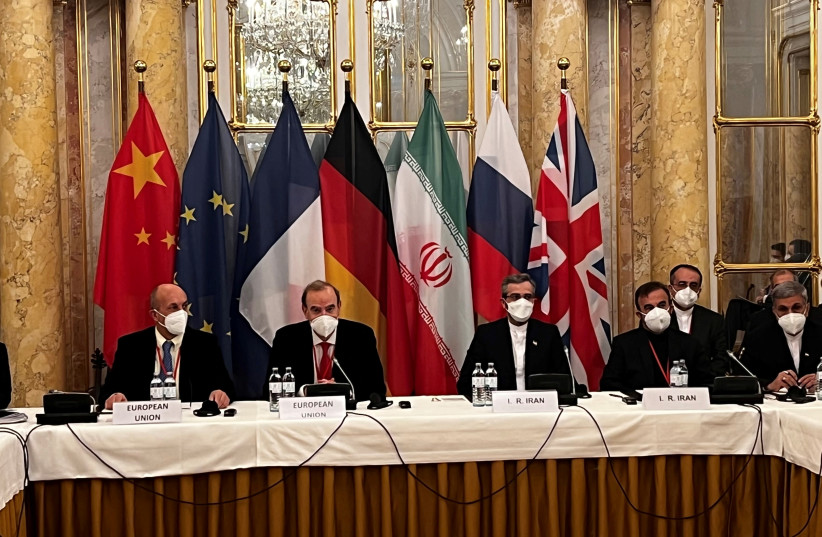As the talks in Vienna restart, much of the focus is on the late-January deadline the US has set for Iran to agree to a return to the 2015 JCPOA nuclear deal.
But is there really a deadline?
In late October, US chief negotiator Rob Malley said Iran had only “weeks or months” to come back to the negotiating table – quickly correcting himself to say just “weeks.”
And Iran did come back to the negotiating table in late November.
Then, mid-negotiations on December 17, European Union envoy Enrique Mora told a news conference, “We don’t have months, we rather have weeks to have an agreement.”

When US National Security Advisor Jake Sullivan came through Israel last week, he repeated the “weeks” as opposed to months formula, tossing out late January as a deadline.
Except then an anonymous US official said February might also be OK.
All of this adds up to the Biden administration signaling the Islamic Republic that it wants to show real progress and stop Tehran’s forward motion toward a nuclear bomb in early 2022 and not late in the year.
But that does not mean there is a real deadline for a full return to the JCPOA.
For one, there is an inherent problem with the Biden strategy, which is not all that different from the problem the Trump and Obama administrations faced at various points.
What is “Plan B?”
It certainly is not the US itself using military force.
For the past year, Washington has overwhelmingly downplayed military power in favor of diplomacy.
America has avoided flexing its military muscle even when it meant tragedy and embarrassment in Afghanistan and even as Russia toyed with the idea (which it still might do) of invading the remaining independent portions of Ukraine.
Biden has been extremely consistent. He wants to be done with conflicts in the Middle East and other peripheral areas so he can focus all of America’s energy on competing with China.
And Washington’s hand on sanctions is pretty much already played out.
Sure, the US could add some additional sanctions, but they would be mostly symbolic given the huge sanctions already imposed. Also, China and Russia are still committed to keeping Iranian Supreme Leader Ayatollah Ali Khamenei afloat.
If China and Russia were saying Khamenei only had weeks to decide, now that would mean something.
But China is still mostly blaming the US for the impasse, and Moscow is willing to declare just about anything other than a complete end to talks as sufficient positive progress to keep going.
It would seem the only card the US has to play would be to unleash Israel to use covert actions or cyberattacks to slow down Iran’s progress.
Maybe that is in the cards.
However, as shown by previous Mossad and cyber operations, these tactics just buy time, and there still needs to be strategy afterward.
The US still has not really articulated that strategy, given that its original strategy – of a quick mutual return to the JCPOA, followed by quick add-on negotiations in which the US would magically convince Iran to agree to filling all of the JCPOA’s holes with no sanctions leverage – did not really come through.
Most likely, the Biden administration is just hoping to get Iran to freeze its forward progress and is willing to give a lot of partial sanctions relief for that goal.
If the Islamic Republic freezes its forward progress, Biden can declare a partial victory and signal to Israel that it has no basis to take independent action during the freeze period.
That is one scenario that could play out, even though everyone says they are against an interim deal.
Yet, what if Khamenei is serious that he will not do an interim deal and wants some of the nonnuclear Trump-era sanctions removed, some kind of upfront payment of sanctions relief first and, of course, getting to keep all advanced centrifuges in storage?
Maybe Biden will cross some of his own redlines and agree to this, which would completely end any possibility of filling the JCPOA’s holes.
But if Biden sticks to his redlines, then we return to asking what meaning the US January-February deadline has.
If there seems to be progress in late February, will Biden really end negotiations with no Plan B?
This is why Iran still has tremendous leverage.
It is up against the world’s superpower, but it can read that superpower’s bluff.
Anything is possible, but neither a full return to the JCPOA in the next few weeks nor major retaliation by Biden against Khamenei for ignoring his deadline are likely.
